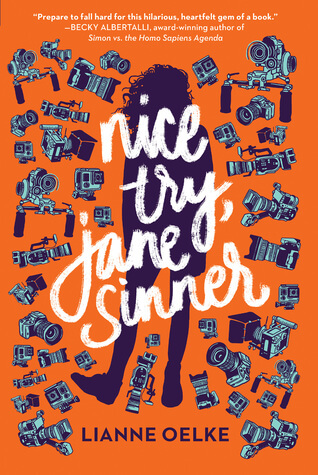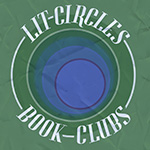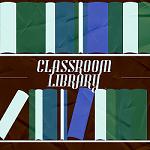Nice Try, Jane Sinner
Author: Lianne Oelke
Published: January 9, 2018 by Clarion
Guest Review by Natalia Sperry
Summary: The only thing 17-year-old Jane Sinner hates more than failure is pity. After a personal crisis and her subsequent expulsion from high school, she’s going nowhere fast. Jane’s well-meaning parents push her to attend a high school completion program at the nearby Elbow River Community College, and she agrees, on one condition: she gets to move out.
Jane tackles her housing problem by signing up for House of Orange, a student-run reality show that is basically Big Brother, but for Elbow River Students. Living away from home, the chance to win a car (used, but whatever), and a campus full of people who don’t know what she did in high school… what more could she want? Okay, maybe a family that understands why she’d rather turn to Freud than Jesus to make sense of her life, but she’ll settle for fifteen minutes in the proverbial spotlight.
As House of Orange grows from a low-budget web series to a local TV show with fans and shoddy T-shirts, Jane finally has the chance to let her cynical, competitive nature thrive. She’ll use her growing fan base, and whatever Intro to Psychology can teach her, to prove to the world—or at least viewers of substandard TV—that she has what it takes to win.
Review: I’ll admit, I’m always a sucker for a strong, sarcastic, and somewhat troubled YA protagonist, and Jane Sinner did not disappoint. Nice Try, Jane Sinner is psychological and philosophical, a little crass and silly, sometimes downright strange, and always full of tremendous heart—but then, isn’t that college? It was refreshing to read an older YA: Jane is right on that cusp of “not really a teenager anymore, but definitely not a full a full-fledged adult.” As she navigates her senior year in high school, taking classes at the local community college, I felt that, even beyond its obvious and intentional quirks, Jane’s story is startlingly unique in how it captures the whirlwind of emotions felt during that transitional time. It also offered a healthy balance of relationships, featuring Jane’s loving yet tense parents, adoring but annoying little sister, and a cast of friends too diverse to affix any one guiding set of adjectives to.
Written in diary-format, the book is told exactly as Jane wants it to be, which adds an interesting dimension of questionability to her narration. Dialogue is captured in script format, which prompts readers to question at times what’s reality and what’s for show, on House of Orange and beyond. What Jane does and doesn’t tell the narrator about her past, her genuine feelings, and her motivation leads to some interesting twists. In particular, Jane’s “Doctor/Self” internal dialogues were really compelling. Like the eponymous Jane Sinner herself, however, the book at times deflects the greater thematic issues at hand through its sarcasm and humor. Jane’s story revolves around a personal crisis—one that I wish the book would have delved in deeper to by the end. I did enjoy Jane’s exploration of religion and the expectations young people are sometimes held to, which is a topic I’ve yet to see be fully explored in YA.
For all its quirks and flaws, Jane Sinner has a heart of gold. It conjures up all the emotions of a teen on the brink of “adulthood,” while still maintaining a sarcastic yet thoughtful spark throughout. It’s refreshing to remember that being a young adult doesn’t end at high school, and life doesn’t have to either.
Teacher’s Tool For Navigation: I’ll admit, I’m always a sucker for a strong, sarcastic, and somewhat troubled YA protagonist, and Jane Sinner did not disappoint. Nice Try, Jane Sinner is psychological and philosophical, a little crass and silly, sometimes downright strange, and always full of tremendous heart — but then, isn’t that college? It was refreshing to read an older YA: Jane is right on that cusp of “not really a teenager anymore, but definitely not a full a full-fledged adult.” As she navigates her senior year in high school, taking classes at the local community college, I felt that, even beyond its obvious and intentional quirks, Jane’s story is startlingly unique in how it captures the whirlwind of emotions felt during that transitional time. It also offered a healthy balance of relationships, featuring Jane’s loving yet tense parents, adoring but annoying little sister, and a cast of friends too diverse to affix any one guiding set of adjectives to.
Written in diary-format, the book is told exactly as Jane wants it to be, which adds an interesting dimension of questionability to her narration. Dialogue is captured in script format, which prompts readers to question at times what’s reality and what’s for show, on House of Orange and beyond. What Jane does and doesn’t tell the narrator about her past, her genuine feelings, and her motivation leads to some interesting twists. In particular, Jane’s “Doctor/Self” internal dialogues were really compelling. Like the eponymous Jane Sinner herself, however, the book at times deflects the greater thematic issues at hand through its sarcasm and humor. Jane’s story revolves around a personal crisis–one that I wish the book would have delved in deeper to by the end. I did enjoy Jane’s exploration of religion and the expectations young people are sometimes held to, which is a topic I’ve yet to see be fully explored in YA.
For all its quirks and flaws, Jane Sinner has a heart of gold. It conjures up all the emotions of a teen on the brink of “adulthood,” while still maintaining a sarcastic yet thoughtful spark throughout. It’s refreshing to remember that being a young adult doesn’t end at high school, and life doesn’t have to either.
Discussion Questions: Even in the context of the book, Jane is quite the controversial character to those around her — did you “like” Jane? How might this shape your perception of the book as a reader? Does “likability” matter in protagonists? Think about if Jane was gender-swapped: would this change how we view some of her more questionable decisions or characteristics?
Flagged: “I need to psychoanalyze myself for Intro Psych. I’m not sure how that’s possible; the prof was rather vague on the specifics in class today. I was also caught up in a doodle of my hand. I outlined my hand on my notes because the notes were ugly and otherwise useless. I layered the inside with different-colored gel pens until the outline was fairly thick. In the middle of the hand I drew toasters and toast. The whole thing came together really well. One of my better efforts. But I’m not sure how to psychoanalyze myself. I suppose I’ll have to be both the doctor and patient. Maybe the two of me can come up with some profoundly insightful insight.
A middle-aged man with thinning brown hair and a cozy sweater vest motions for Jane to lie down on the sofa. He takes a seat on the overstuffed leather armchair and crosses his legs like a girl.
THE DOCTOR
Hello, Ms. Sinner.
JS
Hi.” (Page 46-47).
Read This If You Loved: Anything by John Green (Turtles All the Way Down in particular), Highly Illogical Behavior by John Corey Whaley, Fangirl by Rainbow Rowell, The Hunger Games by Suzanne Collins
Recommended For:





1 thought on “Nice Try, Jane Sinner by Lianne Oelke”